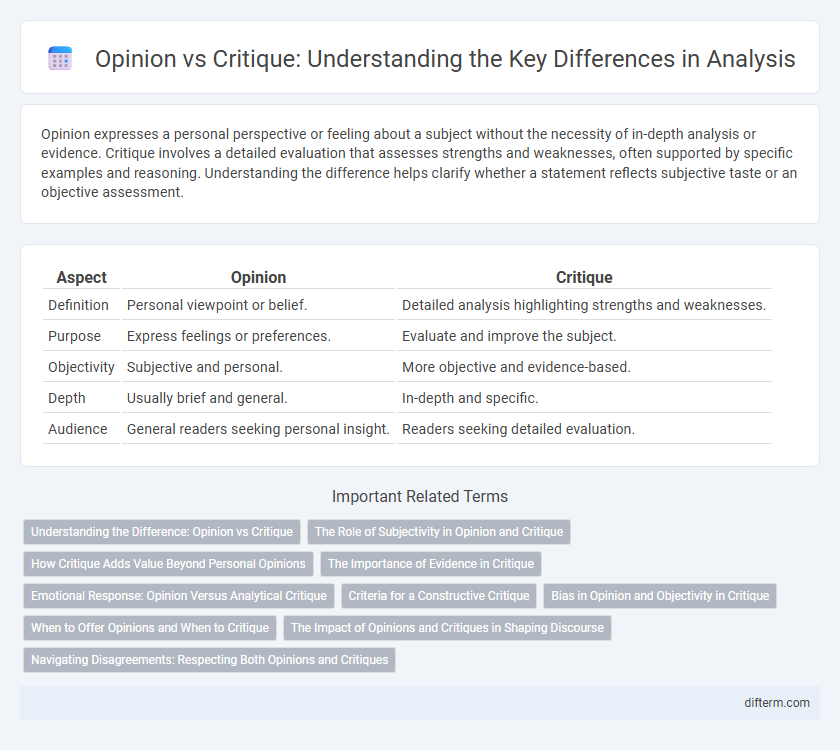Opinion expresses a personal perspective or feeling about a subject without the necessity of in-depth analysis or evidence. Critique involves a detailed evaluation that assesses strengths and weaknesses, often supported by specific examples and reasoning. Understanding the difference helps clarify whether a statement reflects subjective taste or an objective assessment.
Table of Comparison
| Aspect | Opinion | Critique |
|---|---|---|
| Definition | Personal viewpoint or belief. | Detailed analysis highlighting strengths and weaknesses. |
| Purpose | Express feelings or preferences. | Evaluate and improve the subject. |
| Objectivity | Subjective and personal. | More objective and evidence-based. |
| Depth | Usually brief and general. | In-depth and specific. |
| Audience | General readers seeking personal insight. | Readers seeking detailed evaluation. |
Understanding the Difference: Opinion vs Critique
An opinion reflects personal beliefs, feelings, or preferences, often subjective and based on individual experience. A critique provides an informed evaluation, grounded in analysis and evidence, aiming to offer constructive feedback or highlight strengths and weaknesses. Understanding the difference between opinion and critique is essential for meaningful communication and effective assessment.
The Role of Subjectivity in Opinion and Critique
Subjectivity fundamentally shapes both opinion and critique, as personal experiences, values, and emotions influence individual perspectives. Opinions primarily express personal beliefs without the necessity for evidence, while critiques demand analytical evaluation supported by objective criteria. Understanding this distinction clarifies how subjective interpretations impact the formation and reception of judgments in various contexts.
How Critique Adds Value Beyond Personal Opinions
Critique provides structured, evidence-based evaluations that go beyond personal opinions by offering objective insights and constructive feedback. It enhances understanding and improvement by analyzing strengths and weaknesses with specific criteria, allowing for informed decision-making and growth. Unlike subjective opinions, critique fosters meaningful dialogue and progress through systematic assessment.
The Importance of Evidence in Critique
Critique relies fundamentally on evidence to provide a structured and objective evaluation, distinguishing it from mere opinion which is often subjective and unsubstantiated. Valid critiques incorporate empirical data, concrete examples, and logical reasoning to support assessments and recommendations. Emphasizing evidence enhances credibility, promotes constructive feedback, and encourages informed decision-making in various fields such as art, literature, and academic research.
Emotional Response: Opinion Versus Analytical Critique
Opinions evoke emotional responses by reflecting personal beliefs and feelings, often leading to subjective interpretations. In contrast, analytical critiques prioritize objective evaluation and evidence-based reasoning, minimizing emotional bias. This distinction highlights how opinions engage the audience's emotions, while critiques foster intellectual understanding.
Criteria for a Constructive Critique
A constructive critique is grounded in clear, objective criteria such as relevance, accuracy, and clarity, which distinguishes it from a mere opinion based on personal preference. Effective critiques evaluate specific elements like structure, evidence, and coherence, offering actionable feedback rather than subjective judgments. Emphasizing these standards ensures the critique fosters improvement and meaningful dialogue.
Bias in Opinion and Objectivity in Critique
Opinion often reflects subjective bias shaped by personal experiences and emotions, leading to partial interpretations of information. Critique demands objectivity, aiming to evaluate ideas or works based on established criteria and evidence rather than personal feelings. Awareness of bias improves opinion clarity, while adherence to objectivity ensures critique remains fair and constructive.
When to Offer Opinions and When to Critique
Offering opinions is appropriate when sharing personal preferences, beliefs, or subjective views to foster open dialogue and understanding. Critiques should be reserved for instances requiring objective evaluation, constructive feedback, or in-depth analysis to improve a subject or work. Knowing the difference enhances communication effectiveness and respects the context and audience's needs.
The Impact of Opinions and Critiques in Shaping Discourse
Opinions express personal beliefs that influence public discourse by introducing diverse viewpoints and fostering open dialogue. Critiques provide structured analysis that refines ideas, encouraging critical thinking and advancing collective understanding. Both opinions and critiques are fundamental in shaping informed discussions and evolving social narratives.
Navigating Disagreements: Respecting Both Opinions and Critiques
Opinions reflect personal beliefs shaped by individual experiences, while critiques provide structured evaluations based on evidence and analysis. Navigating disagreements requires recognizing the value of both, fostering open dialogue that respects subjective viewpoints and encourages constructive feedback. Emphasizing empathetic listening and clear communication helps bridge the gap between differing perspectives.
opinion vs critique Infographic

 difterm.com
difterm.com